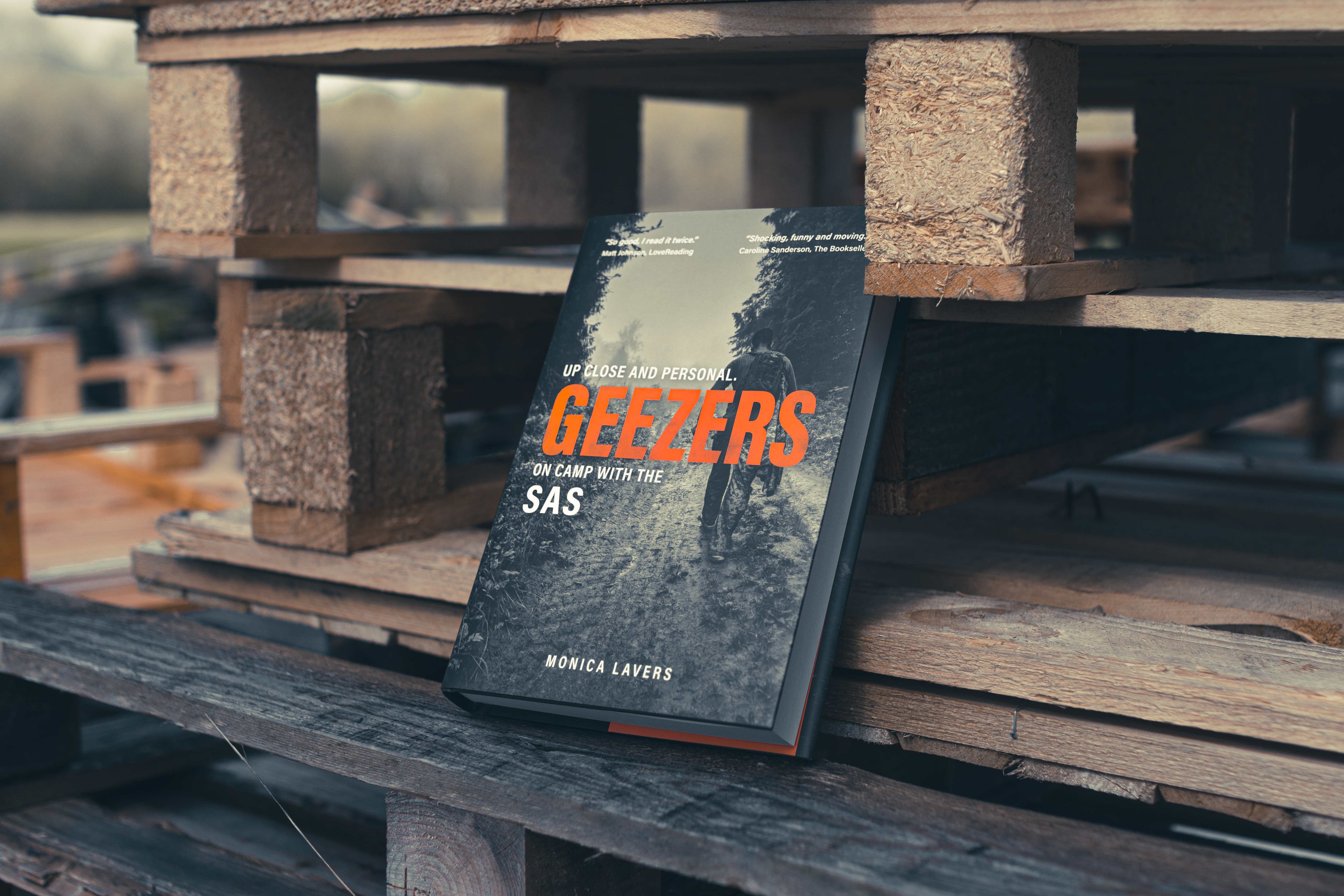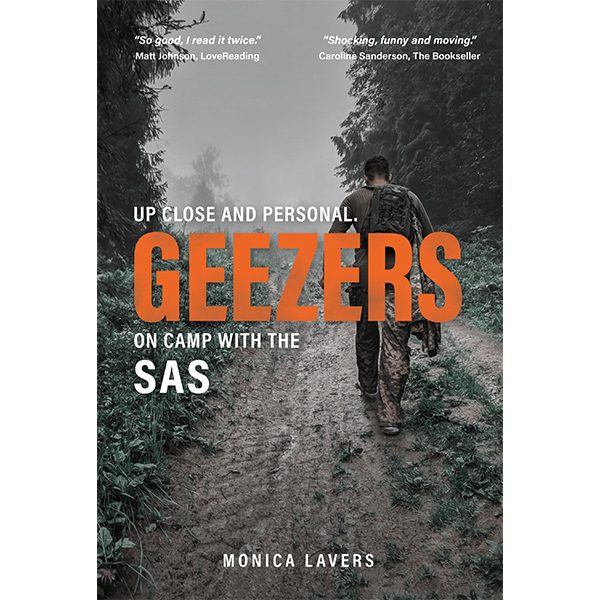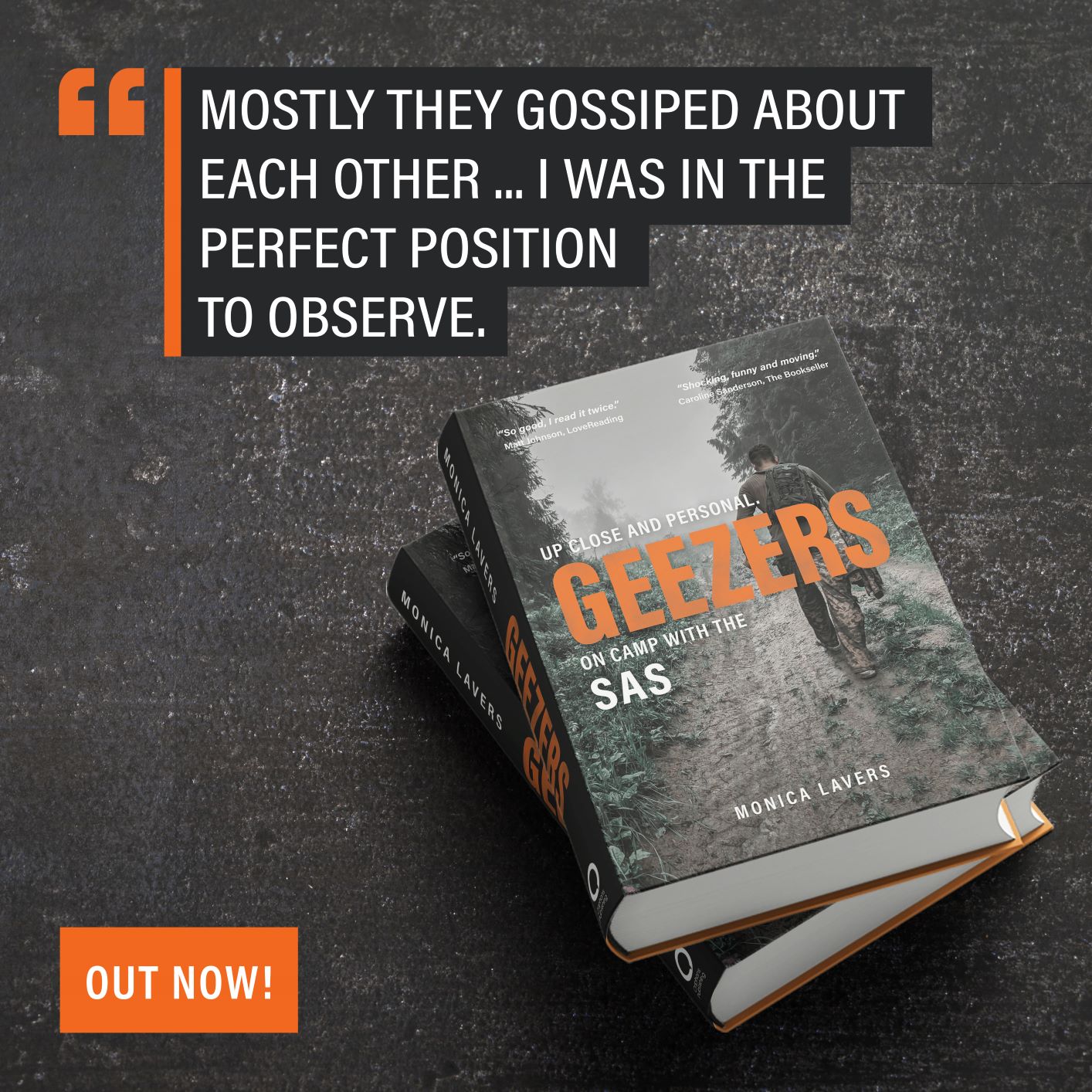
Remembrance Day 2021: Monica Lavers on the Quiet Poignance of Reflection
This Remembrance Day, when as a country we give thanks to the soldiers who have given their life in service to their country, we’re sharing an extract from Monica Lavers’ fascinating memoir, Geezers: Up Close and Personal: On Camp with the SAS. She shares her recollections of the importance of memorials to these elite soldiers, which she witnessed first-hand during her time working on camp in support services between 2015-18.
The quiet tranquility of the Memorial Garden, which honours the fallen heroes of the regiment, is a startling change from the noise that accompanies life at camp, and reminiscent of the reflective silence that washes over the country when we pay our respects to those who have lost their lives in conflict, and the sacrifices made by those in the Armed Forces.
‘I liked writing about the tiny oasis of calm against the constant sounds of distant gunfire.’
Monica Lavers on reliving her visit to the Memorial Garden in her memoir.
From Chapter 9 of Geezers:
In autumn 2015, what with the ‘aptitude’ taster weeks for the surveillance course, the SERE element of selection and everything else, we were packed, but in a nice way. It was good to be busy. Steve, the camp’s general factotum who had been here for more than twenty years was talking about sprucing up the Memorial Garden ready for Remembrance Day and I realised I’d never seen it.
It’s funny now, recalling my apprehension on that day as I set off to find the garden, but it also shows how the atmosphere of the place fed into my spirit. It reminded me of when I was a child and my father told me that a boggy bit of field had a bogeyman in it who would grab my ankles and pull me under and somehow that area became so terrifying I had nightmares about it. It turned out to be nothing more than a big puddle, but fear is a great motivator and I would walk home the long way round rather than think about that puddle. The sinister atmosphere I sometimes encountered in this place ensured I didn’t tempt fate although, as it happened, I tempted fate a couple of months later, and fate took the challenge.
The garden lay behind the mess facility but I’d never seen it because we had no windows facing that direction. I wasn’t sure how to get there but I worked it out, going through a maze of rooms and corridors, snaking this way and that, past some rather nice washrooms for visitors, the oak-panelled conference room, the musty-smelling lounge bar that I had never seen used and out past female accommodation blocks, which were pretty much mothballed.
The autumn sunshine was stunning and soothing. For once there was no sound from The Area; no long line of vehicles clattering their way over the cattle grids, a sound I will always now associate with the camp. Rattle, rattle, rattle, it went all day every day as Land Rovers, ordinary cars, lorries and vans were swiped in, changing gear and rattling the cattle grid as they accelerated up onto The Area then, muddily, up through the woods. But today there was no sound of car engines idling as they sometimes did for hours, or helicopters, or the patter-pat of rapid gunfire. It was completely silent, save for the odd buzz of an insect in the overgrown brambles. I longed to lie in the tall grass and drink in the atmosphere.
Ducking under low branches and crunching on conkers and acorns, I rounded a corner past the remains of a fallen-down wall. For a second I got nervous that I’d be in trouble for going out, but there was no point thinking like that. I was a mess hand, for heaven’s sake, nobody important. But still… the niggle that had been growing in my mind since I came here was taking root. I was new. I might be the very person they might want to keep an eye on. And then there it was: The Memorial Garden.
It felt like the garden had come to meet me, rather than the other way around. It was small and circular, another place where the legend of the entire camp probably lent more to the scene than it deserved. There were no graves, just a neat semi-circle of wreaths around a memorial cross. I turned, and there was a convenient parting of the wild bushes and branches and a clear sight of a criss-cross of paths surrounded by neatly clipped low box hedge.
I went through the gate and stood, transfixed. For a moment it seemed impossible that I could be in this place that I associated with brutality and anger and pain and suddenly feel overwhelming peace. The attention to detail was unsurpassed; there was not a single leaf on the ground, the grass was lush and cared-for. I was just taking all this in when I heard a very slight click. Had it been one of the usual days on camp, with noise coming from The Area, I wouldn’t have heard it, but that click and the slight whirring sound made me look up. I saw a tiny camera high on the side of a wall. I looked at it, though I didn’t know what I was hoping to see because I knew perfectly well that it was a CCTV camera. Suddenly, instead of it just being a motionless thing, it seemed to come to life. Its face dipped down slowly and almost soundlessly to look at me directly, like a parent looking down at a toddler to warn them to behave. I felt like a prisoner caught on the run.
In the next moment I heard the slight crack of a twig and a rustling; I was aware almost of the temperature changing. I turned and saw a couple of badged men sitting on a bench. I couldn’t tell if they were looking at me because they were wearing sunglasses and the sun was too bright in any case, but they must have been there all the time. I felt stupid, as if I had been caught rifling through someone’s private drawers. I tried to work out why I felt like this – it was only a memorial garden, after all, and I had my security pass around my neck. I was keen to give the impression that I had every right to be there, so I made my walking posture very casual and turned to read the words on the memorial. I couldn’t see them without my glasses but I stood and pretended, which was absurd. I think I also made a point of bending to re-do the laces on my shoes, then thought better of it and pulled myself up sharp. Eventually I set off in a deliberately nonchalant way, not really sure which path to take. Going back was different from coming to find the garden, and I crashed along the path, tripping once on a low bramble and hurting my knee. I wanted to get away but trying to be unnoticeable was impossible.
‘How’re you getting on here, then?’ asked one of the guys. He was a squat, powerful man with a flaming red beard, short hair and a broad Lancashire accent. He took off his sunglasses and gave me a nice smile. ‘Settled in?’ asked the other, a very tall, dark and almost spectral bent-over type of guy, the sort who is just too tall and gangly to fit in anywhere. I recognised them – I’d seen them both in the dining room.
‘Well,’ I said, deciding to keep it light, ‘um… yes. Thank you. You’re the DS, aren’t you?’
‘Tough work, I bet, yours?’ said the first.
‘Oh, it’s OK,’ I said nervously. ‘I enjoy it. My name’s Monica.’
‘Charlie’ said the first guy. He got up and came to shake my hand.
I knew perfectly well who he was – Charlie Rossall, known as the Blackpool Bruiser, was infamous. For what, I had no idea, but he was almost in the ‘legend’ category on camp.
‘Jos,’ said the other man.
The course members had been given a task, the DS’s told me, and they had another half hour before they needed to head back to The Area to see how they’d got on. We talked about the younger, newer Regiment intake, and to my surprise they asked if I’d been hassled by any of them.
‘Hassled?’ I said, puzzled. ‘You’re joking? Nobody in their right mind would come on to me, kitchen cleaner and all that.’ I was looking at the ground, beginning to blush.
‘I think if they had the bottle they would,’ Charlie said. ‘It’s not the coming on to you. It’s more the rejection.’
Charlie was ersine, short-limbed, massive-bodied, legs and feet looking fused as he lumbered heavily but his running ability took everybody by surprise. You should see him go, they said, especially on hills. He leaves everyone in the weeds, they said.
‘Thing is, Monica,’ said Jos, looking at Charlie for confirmation, ‘we all think we’re the dog’s bollocks, don’t we, mate? When alpha males are all thrown together in one organisation, it’s carnage. We’re all like that.’
‘You need to look at us like dogs,’ agreed Charlie. ‘Take a German Shepherd, for example. When it’s a young dog all it wants to do is fight and fuck, then as it gets older it calms down and starts to become sociable as it understands the game.’
‘True,’ Jos said. ‘Then a dog gets to my age and all it wants to do is sleep and be stroked.’ They both chuckled.
It was nearly three o’clock and the sun was quite fierce now. It was beautiful. Both guys kept running their fingers round under the necks of their base layers, and their faces were glistening.
‘Aren’t you uncomfortable, sitting in all that body armour?’ I asked.
They shook their heads and shrugged.
‘See, this is where I’m strange,’ said Charlie. He leaned forwards, elbows on his knees, making a steeple with his fingers as if he were about to launch into a long tale of battle. ‘I have a real thing about my uniform and my armour. I hold it quite sacred, in that it’s meant for my protection in battle and all that. I’m a romantic at heart with all that knight stuff. In the dark sense, not the rescuing a damsel thing. Does that make sense?’
It didn’t – how could it? But I nodded.
‘To me that’s why I would think of it as sexy,’ he went on. ‘A tool of war, and all that.’
They both stood up and looked at their watches. The way Charlie and Jos looked right then was deeply impressive, forceful and intimidating, but these top dogs who could take control of any war situation were simply chatting and enjoying the sunshine on a quiet afternoon like I was, something we all can do.
‘Can I ask you a question?’ Charlie Rossall made a strange stance, which seemed to suggest that he wasn’t comfortable with what he was going to ask.
‘Of course.’
‘You’re not exactly the typical mess hand. What made you come here?’
I took a deep breath, not sure how to put this, but the memorial garden and its atmosphere of spiritual contemplation had inspired me.
‘You’ve heard the saying “Cast your nets on the other side?”’ I asked them. ‘It’s a parable from the Bible which says, basically, that if you don’t go fishing, you can’t catch any fish. So you have to make an effort. In the parable the fishermen have been out all night and caught nothing but then they’re told to cast their nets on the other side.’
‘I remember now,’ said Jos.
‘Well, if you follow the prompting in your head to try something new, that’s the moment when a miracle can happen,’ I said. ‘Cast your net on the other side and you might find your net bursting with fish.’
‘And you think this job was your best catch?’ Jos asked.
I looked at them, caught in the autumn sunlight, handsome men, the cream of the crop that was for sure, men who hadn’t yet experienced work drying up, people turning their backs on them. They had only known the security of the army.
‘I think you have to be open to finding out what else there is,’ I said. ‘It might be washing dishes today, but who knows which fertile fishing grounds I’ve uncovered just by looking somewhere I hadn’t considered before?’
As the two men left, I secretly hoped they would be back later for evening meal although I guessed they wouldn’t. They had homes to go to. They probably had wives, complaining about them working weekends, and children needing to be taken to ballet or football.
I have rarely felt more conspicuous than I did that afternoon in a beautiful, sunlit, peaceful place dedicated to the fallen heroes of one of the most famous regiments in the world. It was strange: once back in the mess building I felt relief, like a rabbit being chased finding its way back to the burrow. I decided not to venture out there again. For now, my life was inside that kitchen. Everything out there that we saw, we saw through glass. There never was much to see, no people walking about, but I think we all still gazed to take our minds elsewhere, like when the doctor takes your blood pressure and tells you to think of a nice holiday scene to relax you. I sat there until it was time to get up and start mopping the floors.
Featured Publications

